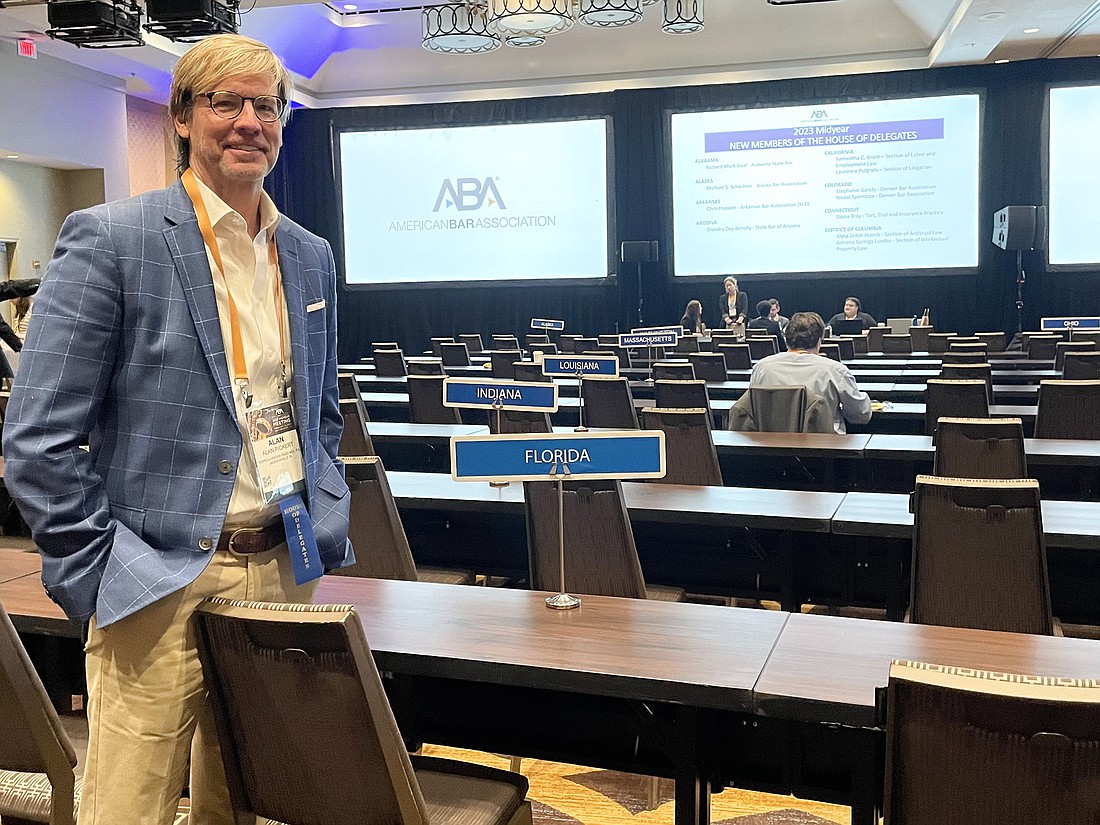
Representing Jacksonville, one of just a handful of Florida delegates to the American Bar Association and a delegate on its policymaking body, I attended in February the annual ABA Midyear Meeting and House of Delegates Convention in New Orleans.
Numerous policies and resolutions were debated and recommended.
With a rise in violence and other incidents directed at members of the Jewish faith, the House passed Resolution 514, which condemns antisemitism and proposes certain measures to combat it.
The report accompanying the new policy notes that compared to most of the world, America has been a haven for freedom, but the U.S. is not immune from the scourge of antisemitism. The past decade of social upheaval, economic uncertainty and violent political polarization are fanning its flame, both in the U.S. and abroad.
My law partner of 30 years, Evan Yegelwel, is a prominent member of the Jewish community and has taught me so much about the fight against antisemitism.
We should do everything in our power to eliminate ignorance and hate.
The HOD rejected a proposal by its independent law school accrediting arm to remove the standard that requires most incoming law students to have a “reliable and valid” admissions test, which typically is the Law School Admission Test.
The issue of diversity was advocated by both those who wish to make the LSAT optional and those who wish it to be required.
I voted with the majority for keeping the LSAT as a requirement after being persuaded by recent data that shows recent first-year incoming classes at law schools are at an all-time high for minorities and continue to climb upward.
If a student has a 1,400 on the LSAT, it doesn’t matter the color of their skin, gender, where they live or who they know. They are getting admitted into a good law school.
Another hotly contested issue was Resolution 40, which urges the U.S. Supreme Court to adopt a code of judicial ethics binding for its justices that is comparable to the code of conduct for other federal judges adopted by the Judicial Conference of the United States.
Advocates of the change say there needs to be a clearly articulated, binding code of ethics for members of the highest court in the country.
How do you tell the American public that every judge in the U.S. follows a written judicial code of conduct and ethics except the highest court in the land? If the legitimacy of the Supreme Court is diminished and not held in the highest regard, then the legitimacy of all our courts and judicial system is called into question.
The HOD also passed its first anti-money-laundering policy, which seeks to balance the long-standing attorney-client privilege with the demands of governmental entities seeking access to information about criminal activities such as money laundering, terrorism financing, human trafficking and other corrupt conduct.
It follows a lengthy review by the ABA Working Group on Beneficial Ownership and recognizes efforts by Congress, which has enacted legislation to combat criminal activity.
A recent law, for example, requires certain business entities to file, in the absence of an exemption, information on their beneficial owners with the Financial Crimes Enforcement Network of the U.S. Department of the Treasury.
A beneficial owner is a person who enjoys the benefits of ownership although an asset’s title is listed in another name. Under federal financial regulations, a beneficial owner is anyone with more than 25% ownership of a legal entity, or anyone who controls the legal entity.
The new policy urges that any governmental disclosure requirements protect constitutional rights and confidentiality interests and not conflict with the ethical duties, professional conduct requirements and regulations imposed on the legal profession by other governmental entities. It also says these requirements should “not undermine the applicable rules of professional conduct to which lawyers are subject.”
We also approved several policies related to criminal justice matters.
Resolution 501 adopts the 10 Principles to Achieve Gender Equity in the Criminal Legal Profession, intended to advance the goal of gender equity among employers, institutions and people who are part of the criminal legal profession.
The principles, for instance, put emphasis on creating culture change by dismantling barriers in various phases of the criminal justice field including hiring, retention and promotion of women.
Another resolution urges the creation of policies and practices to improve the treatment of people living with dementia who are involved in the criminal justice system.
In the medical area, Resolutions 511-513 adopted policies that oppose governmental efforts that attempt to impose medical or surgical intervention on minors with intersex traits (also known as variations in sex characteristics) without the minor’s informed consent or assent; unreasonably interfere with a person’s ability to direct their own health care, including their right to refuse unwanted medical treatment and their legally authorized substitute decision-makers’ rights to refuse medical treatment on their behalf; and restrict the right of any individual to travel interstate to access medical care.
Other proposals adopted as ABA policy include:
< Resolution 606 encourages state and territorial Bar licensing entities to eliminate from required Bar applications any questions that ask about sexual orientation or gender identity and to eliminate processes that could lead to unintended disclosure of sexual orientation or gender identity without explicit consent from the applicant.
< Resolution 508 supports efforts seeking a wildlife crime protocol to the United Nations Convention on Transnational Organized Crime to end “wildlife crime,” which is referred to as “wildlife trafficking.” The report in support of the resolution notes that the absence of a global agreement constrains efforts to effectively prevent and combat wildlife crime and that the current legal framework is outdated and inadequate, including a lack of a universal definition of wildlife and related crimes. Alan Pickert is a partner at the Terrell Hogan Yegelwel law firm and past president of the Jacksonville Bar Association.